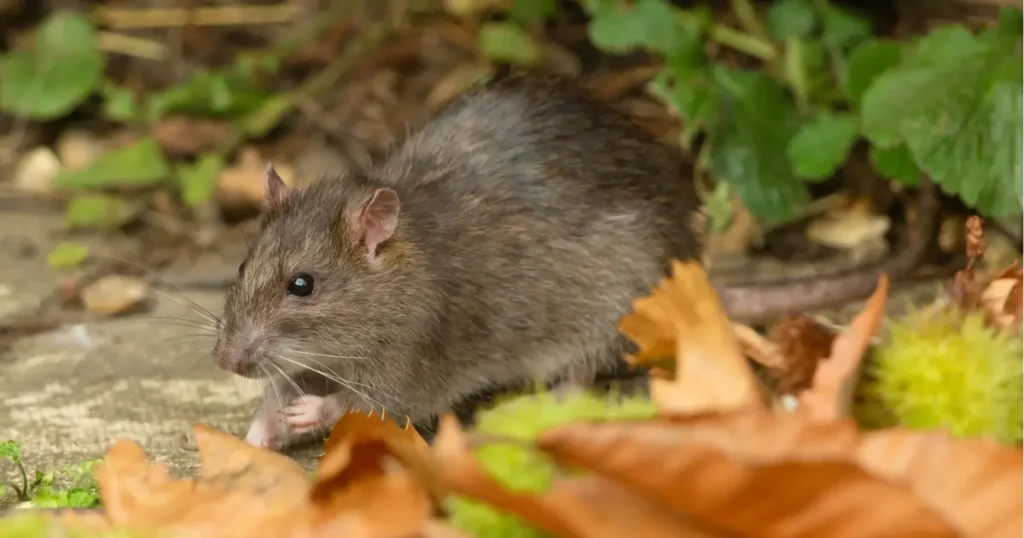
Photo by Callingcurlew23 / Getty Images
By Nicole Fenwick, MSc
Manager of Research and Standards, BC SPCA
Managing uninvited rodents in your home can be stressful – but there are humane ways to prevent problems from arising and helping rodents find their ways outdoors.
The Fur-Bearers enlisted the support of Nicole Fenwick, Manager of Research and Standards and the AnimalKind accreditation program at the BC SPCA, to answer frequently asked questions on humane management of rodents in homes.
Q: I have mice in my house. What do I do?
A: The first step is to assess how the mice are getting into your living space. Are there holes in your walls, or spaces around pipes? Pull out large appliances (fridge, stove) and look behind them for holes and signs of rodent activity. Walk around the outside of your home and look for exterior holes that rodents may have used to get inside. You should also assess the attractants in and around your home. Is pet food left out all day? Do you have a bird feeder? Are there many places where mice could hide? Mice love to chew on, and nest in, cardboard boxes so examine these.
Now start your preventive work. Repair holes with rodent exclusion materials like heavy or 16-gauge wire mesh with 1cm x 1cm gap size, use metal mesh filler to stuff into holes around pipes, and expanding foam sealant to spray overtop of metal mesh and to fill other gaps and cracks. Pull furniture away from walls and clean up clutter to decrease hiding spots. Store food in rodent-proof containers. Click here for a rodent-proofing checklist.
Q: How do I humanely release trapped mice or rats from live traps?
A: When using live traps to catch rodents, be sure to check them frequently as these tiny animals can easily experience heat or cold distress or become dehydrated. If possible, provide water and food inside the live trap. You are required by law to release trapped rats and mice on the same property that they were captured on. It is illegal to transport and release them in another location (it can spread diseases and cause an increase in rodent population in the new location). Before releasing, make sure you have rodent-proofed the exterior of your home so they stay out!
Q: Is relocation humane?
A: Relocation – also known as trap-and-release – is generally not considered humane. Trapped animals often injure themselves trying to escape a trap. During relocation, they are transported long distances away from their home range and may starve trying to find food or get into fights with other animals in the unfamiliar territory. There is also a high risk of separating mother animals from their babies. Without the mother, vulnerable babies have no way feed or care for themselves and will mostly likely die.
Q: What’s wrong with using glue traps?
A: Glue traps (also known as sticky traps) cause severe pain and suffering. They are designed to catch animals but not kill them. Typically these traps are left unchecked for long periods of time, so trapped animals can live for more than 24 hours before dying from suffocation, dehydration, starvation, exhaustion or exposure. If the trap is checked and a live rodent is found, there is also the problem of how to kill the animal. Very sadly, manufacturer’s simply advise users to discard the “used” trap into the garbage. The intended target for glue traps are rodents however, other unintended animals like birds, bats, small mammals, reptiles, amphibians and even pets have all been caught in them. Since there are alternatives to their use, there is no reason to use glue traps.
Q: I live in a strata, how can I encourage them to use humane pest control options?
A: To make the case to your strata council for wildlife-friendly pest management, start by first understanding the current situation. Does your strata use rodenticides or glue traps (hint, look for black boxes around your building), are there signs of rodent activity, are garbage and recycling properly contained, are there areas where building repairs are needed? Review the strata’s pest control contract to learn about service frequency and monthly cost.
Make the case to switch to humane options by explaining how humane options protect pets and non-target wildlife, reduce the risk of poisons entering streams and green spaces, and provide long-term solutions to keeping wildlife out of buildings. Solving pest problems by getting to the root cause will also provide more value for money and could eliminate monthly pest control servicing costs. Read more about rodenticide-free stratas by clicking here.
Nicole Fenwick, MSc, is a graduate of the UBC Animal Welfare Program and is currently Manager, Research and Standards at the BC SPCA. At the BC SPCA she leads the AnimalKind accreditation program which promotes science-based, humane standards for animal-related services, including wildlife control, dog training, and pet care services.
